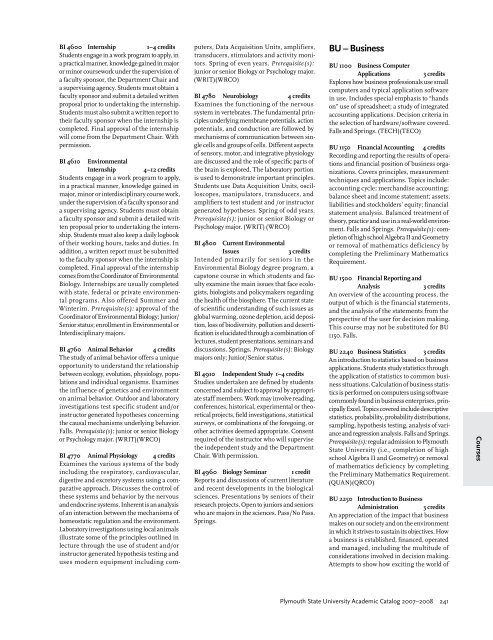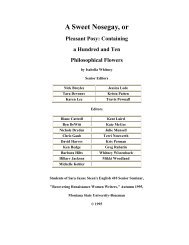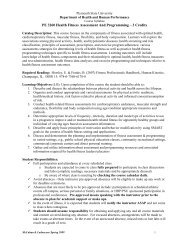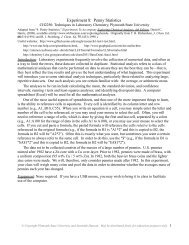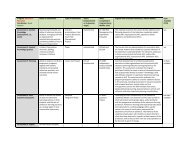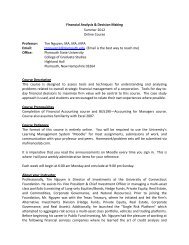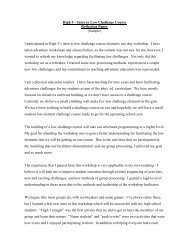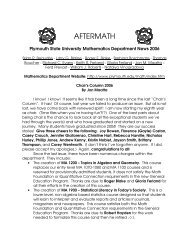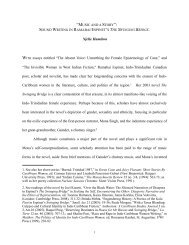2007-2008 Undergraduate Academic Catalog - Plymouth State ...
2007-2008 Undergraduate Academic Catalog - Plymouth State ...
2007-2008 Undergraduate Academic Catalog - Plymouth State ...
- No tags were found...
You also want an ePaper? Increase the reach of your titles
YUMPU automatically turns print PDFs into web optimized ePapers that Google loves.
BI 4600 Internship 1–4 creditsStudents engage in a work program to apply, ina practical manner, knowledge gained in majoror minor coursework under the supervision ofa faculty sponsor, the Department Chair anda supervising agency. Students must obtain afaculty sponsor and submit a detailed writtenproposal prior to undertaking the internship.Students must also submit a written report totheir faculty sponsor when the internship iscompleted. Final approval of the internshipwill come from the Department Chair. Withpermission.BI 4610 EnvironmentalInternship 4–12 creditsStudents engage in a work program to apply,in a practical manner, knowledge gained inmajor, minor or interdisciplinary course work,under the supervision of a faculty sponsor anda supervising agency. Students must obtaina faculty sponsor and submit a detailed writtenproposal prior to undertaking the internship.Students must also keep a daily logbookof their working hours, tasks and duties. Inaddition, a written report must be submittedto the faculty sponsor when the internship iscompleted. Final approval of the internshipcomes from the Coordinator of EnvironmentalBiology. Internships are usually completedwith state, federal or private environmentalprograms. Also offered Summer andWinterim. Prerequisite(s): approval of theCoordinator of Environmental Biology; Junior/Senior status; enrollment in Environmental orInterdisciplinary majors.BI 4760 Animal Behavior 4 creditsThe study of animal behavior offers a uniqueopportunity to understand the relationshipbetween ecology, evolution, physiology, populationsand individual organisms. Examinesthe influence of genetics and environmenton animal behavior. Outdoor and laboratoryinvestigations test specific student and/orinstructor generated hypotheses concerningthe causal mechanisms underlying behavior.Falls. Prerequisite(s): junior or senior Biologyor Psychology major. (WRIT)(WRCO)BI 4770 Animal Physiology 4 creditsExamines the various systems of the bodyincluding the respiratory, cardiovascular,digestive and excretory systems using a comparativeapproach. Discusses the control ofthese systems and behavior by the nervousand endocrine systems. Inherent is an analysisof an interaction between the mechanisms ofhomeostatic regulation and the environment.Laboratory investigations using local animalsillustrate some of the principles outlined inlecture through the use of student and/orinstructor generated hypothesis testing anduses modern equipment including computers,Data Acquisition Units, amplifiers,transducers, stimulators and activity monitors.Spring of even years. Prerequisite(s):junior or senior Biology or Psychology major.(WRIT)(WRCO)BI 4780 Neurobiology 4 creditsExamines the functioning of the nervoussystem in vertebrates. The fundamental principlesunderlying membrane potentials, actionpotentials, and conduction are followed bymechanisms of communication between singlecells and groups of cells. Different aspectsof sensory, motor, and integrative physiologyare discussed and the role of specific parts ofthe brain is explored. The laboratory portionis used to demonstrate important principles.Students use Data Acquisition Units, oscilloscopes,manipulators, transducers, andamplifiers to test student and /or instructorgenerated hypotheses. Spring of odd years.Prerequisite(s): junior or senior Biology orPsychology major. (WRIT) (WRCO)BI 4800 Current EnvironmentalIssues3 creditsIntended primarily for seniors in theEnvironmental Biology degree program, acapstone course in which students and facultyexamine the main issues that face ecologists,biologists and policymakers regardingthe health of the biosphere. The current stateof scientific understanding of such issues asglobal warming, ozone depletion, acid deposition,loss of biodiversity, pollution and desertificationis elucidated through a combination oflectures, student presentations, seminars anddiscussions. Springs. Prerequisite(s): Biologymajors only; Junior/Senior status.BI 4910 Independent Study 1–4 creditsStudies undertaken are defined by studentsconcerned and subject to approval by appropriatestaff members. Work may involve reading,conferences, historical, experimental or theoreticalprojects, field investigations, statisticalsurveys, or combinations of the foregoing, orother activities deemed appropriate. Consentrequired of the instructor who will supervisethe independent study and the DepartmentChair. With permission.BI 4960 Biology Seminar 1 creditReports and discussions of current literatureand recent developments in the biologicalsciences. Presentations by seniors of theirresearch projects. Open to juniors and seniorswho are majors in the sciences. Pass/No Pass.Springs.BU – BusinessBU 1100 Business ComputerApplications3 creditsExplores how business professionals use smallcomputers and typical application softwarein use. Includes special emphasis to “handson” use of spreadsheet; a study of integratedaccounting applications. Decision criteria inthe selection of hardware/software covered.Falls and Springs. (TECH)(TECO)BU 1150 Financial Accounting 4 creditsRecording and reporting the results of operationsand financial position of business organizations.Covers principles, measurementtechniques and applications. Topics include:accounting cycle; merchandise accounting;balance sheet and income statement; assets,liabilities and stockholders’ equity; financialstatement analysis. Balanced treatment oftheory, practice and use in a real-world environment.Falls and Springs. Prerequisite(s): completionof high school Algebra II and Geometryor removal of mathematics deficiency bycompleting the Preliminary MathematicsRequirement.BU 1500 Financial Reporting andAnalysis3 creditsAn overview of the accounting process, theoutput of which is the financial statements,and the analysis of the statements from theperspective of the user for decision making.This course may not be substituted for BU1150. Falls.BU 2240 Business Statistics 3 creditsAn introduction to statistics based on businessapplications. Students study statistics throughthe application of statistics to common businesssituations. Calculation of business statisticsis performed on computers using softwarecommonly found in business enterprises, principallyExcel. Topics covered include descriptivestatistics, probability, probability distributions,sampling, hypothesis testing, analysis of varianceand regression analysis. Falls and Springs.Prerequisite(s): regular admission to <strong>Plymouth</strong><strong>State</strong> University (i.e., completion of highschool Algebra II and Geometry) or removalof mathematics deficiency by completingthe Preliminary Mathematics Requirement.(QUAN)(QRCO)BU 2250 Introduction to BusinessAdministration 3 creditsAn appreciation of the impact that businessmakes on our society and on the environmentin which it strives to sustain its objectives. Howa business is established, financed, operatedand managed, including the multitude ofconsiderations involved in decision making.Attempts to show how exciting the world ofCourses<strong>Plymouth</strong> <strong>State</strong> University <strong>Academic</strong> <strong>Catalog</strong> <strong>2007</strong>–<strong>2008</strong> 241


